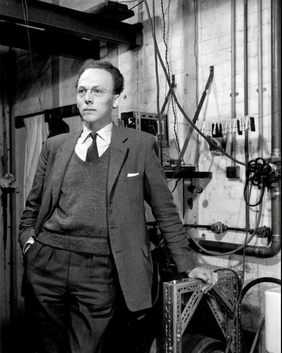Henry Hall (physicist) facts for kids
Quick facts for kids
Henry Hall
FRS
|
|
|---|---|

Henry Edgar Hall, FRS
© Gonville & Caius College, Cambridge |
|
| Born |
Henry Edgar Hall
28 September 1928 |
| Died | 4 December 2015 (aged 87) |
| Education | Latymer Upper School |
| Alma mater | Emmanuel College, Cambridge |
| Known for | Low temperature physics |
| Spouse(s) | Patricia A Broadbent |
| Children | Stephan, Ian and Daphne. |
| Awards | See list |
| Scientific career | |
| Thesis | The Rotation of Liquid Helium II (1957) |
| Doctoral advisors | Donald Osborne David Shoenberg |
Henry Edgar Hall (1928 – 2015) was a brilliant scientist who studied how things behave at super cold temperatures. He was a professor of low temperature physics at the University of Manchester in England. He won the important Guthrie Medal and Prize in 2004 for his amazing work. Dr. Hall earned his Ph.D. in 1957, focusing on how a special kind of liquid helium spins. He taught and researched at the University of Manchester for many years, from 1958 until he retired in 1995.
Contents
Henry Hall's Early Life and Education
Henry Hall was born in London on September 28, 1928. His parents were John Ainger Hall and Elsie Chatterton. He went to Lowther Primary School in Barnes until he was nine. Then, he moved to Latymer Upper School in Hammersmith.
After school, Henry joined the Royal Air Force for his National Service. He worked as an electrician in Egypt. In his final year at school, he won a special scholarship to Emmanuel College, Cambridge. He started studying natural sciences there in 1949 and graduated with top honors.
Discovering Superfluid Helium
After college, Henry became a research student at the Royal Society Mond Laboratory. This lab was part of the famous Cavendish Laboratory. He decided to study liquid helium, which is helium cooled to extremely low temperatures. His first supervisors were Donald Osborne and later David Shoenberg.
While waiting for his lab equipment, Henry wrote a paper. It helped explain some confusing observations about how heat moves in a special type of helium called superfluid helium. Superfluid helium can flow without any friction, which is very unusual! His first experimental results were published in 1955.
Career at Manchester University
In 1958, Henry Hall became a lecturer at the University of Manchester. He stayed there for the rest of his career. He worked with other scientists to study the Mössbauer effect. This effect helps scientists learn about the tiny structure of materials.
In 1961, Henry was promoted directly to a professor. He played a big part in developing dilution refrigerators. These are special machines that can reach incredibly cold temperatures, even colder than liquid helium. His knowledge of working at very low temperatures led him to study another type of helium, called helium-3 (3He). He was especially interested in its superfluid state.
Henry Hall retired in 1995. However, he continued his research full-time until 2000. He called this period his "second graduate studies." During this time, he did experiments on how helium-3 flows at high speeds. He wrote a paper in 2001 summarizing his findings.
Family Life
Henry Hall married Patricia Broadbent, who was also a physics student, in 1962. They had two sons, Stephan and Ian, and a daughter named Daphne.
Henry Edgar Hall passed away on December 4, 2015, in Bolton.
Awards and Achievements
- 1963 Simon Memorial Prize, Institute of Physics (with W. F. Vinen)
- 2004 Guthrie Medal and Prize, Institute of Physics
 | Toni Morrison |
 | Barack Obama |
 | Martin Luther King Jr. |
 | Ralph Bunche |

